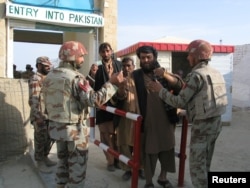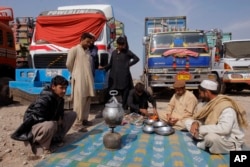Pakistan opened all border crossings with landlocked Afghanistan for travelers and trade convoys Monday, a month after closing them on grounds terrorists were using Afghan soil for plotting deadly attacks against the country.
Prime Minister Nawaz Sharif has taken the decision “as a goodwill gesture” and hoped the Afghan government would take steps required to address “the reasons” that triggered the border closure, according to an official announcement.
“Despite the fact those involved in terrorist activities in Pakistan have a connection with anti-Pakistani elements in Afghanistan, the closure of the border between the two countries, having centuries old religious, cultural and historic relations, was against the economic and public interests,” Sharif said.
A welcomed move
A presidential spokesman in Kabul has welcomed the Pakistani decision but reiterated that closing borders is not the way to address political issues between the two countries.
Pakistan and Afghanistan share a 2,600-kilometer largely porous border, with five dedicated crossings for legal movements, including bilateral and transit trade convoys, transporting imported goods to the landlocked country from the Pakistani port of Karachi on the Arabian Sea.
Authorities abruptly shut the border in mid-February after a string of suicide bombings in Pakistan killed scores of people. Militants linked to the anti-state Pakistani Taliban and local affiliates of Islamic State claimed responsibility for the violence.
Islamabad blamed terrorist sanctuaries on the Afghan side for plotting the attacks and demanded action against them. Kabul rejected the charges and in turn repeated long-running demands for Pakistan to uproot alleged militant training facilities on its soil insurgents use for attacks in Afghanistan.
Financial cost
The protracted border closure has cost businesses on both sides tens of millions of dollars and fueled bilateral tensions.
The abrupt move stranded thousands of trucks loaded with fresh fruits, vegetables, poultry and other food items, sharply increasing prices of imported goods in Afghanistan.
The lucrative border crossings, including Torkham and Chaman, have been been closed five times within the last year due to tensions in relations and Pakistan's attempts to build new facilities there.
Members of Pakistan Afghanistan Joint Chamber of Commerce and Industry last week urged their respective governments “to segregate business and trade ties from political tensions, and separate security and political issues from economic activities between the two countries" to ensure free flow of trade.






